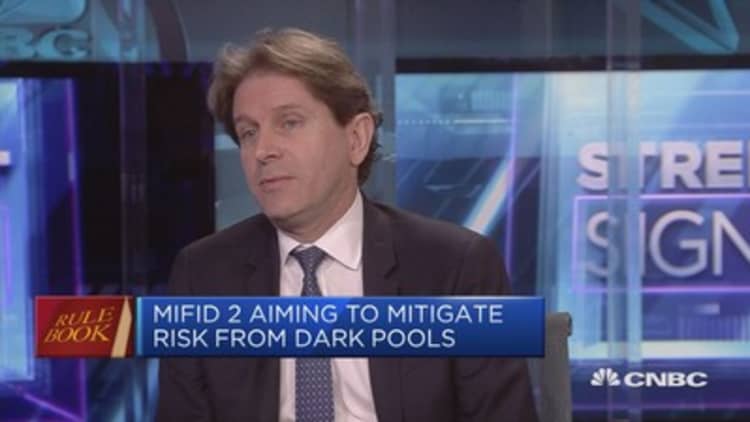
A new set of rules comes into force for the European financial sector on January 3, which are set to have far-reaching consequences for the industry.
The reforms are an attempt to shine more light on how and when assets are traded. Anyone buying or selling stocks, bonds, foreign exchange, commodities or exchange-traded funds (ETFs) will be affected by the new standards.
The European Commission, the executive arm of the EU, kick-started the launch of the legislation, known as Mifid II, after the original set of rules was found wanting in the wake of the 2008 financial crisis.
Mifid stands for the "Markets in Financial Instruments Directive." CNBC explains what it is and how it will affect the financial sector.
What is the update for?
The original Mifid arrived in November 2007, just as the dam of the financial crisis was about to break wide open. Its intent was to help Europe integrate its disparate financial markets and drive down trading costs.
Its main focus was on stocks but now Mifid II wants to widen the rules to incorporate other asset classes.
It is also an attempt to better regulate over-the-counter (OTC) contracts, which involve direct transactions between a buyer and a seller, by pushing them on to exchanges.
European financial regulators say the new rules will improve investor confidence and strengthen the industry.
A worldwide impact
While the rules are set by the EU and will cover all of the countries within the bloc, it will affect some trades in other jurisdictions.
Options — a type of financial derivative used by traders — which have an underlying asset listed in Europe will fall under the legislation and any stocks that have a separate listing in Europe will again be subject to the new rules.
Another example would be a bank in Asia selling financial instruments to an EU client.
Global institutions carrying out such trades are also being pressed to move away from phone trades and onto electronic platforms, to allow better auditing.
Mifid II demands 50 more data fields to be completed for each trade than its predecessor and is reported to be clashing with privacy rules that govern other regions.
Are analyst jobs under threat?
The new regulation also forces fund managers to pay brokers and banks separately for research and trading services, rather than just one combined fee for both activities.
It is explained as an attempt to increase transparency within fund management, as clients will directly see how their money is being used.
It has been widely reported that most asset managers will absorb the costs with the likely effect that overall spend on analysis will fall.
Management consultancy Oliver Wyman has estimated global investment research spend could fall by as much as $1.5 billion annually, when the rules come into force in January.
The consultancy estimates a current global total spend of $5 billion.
Some also believe the new rules could see "star analysts" leave banks and set up on their own as they attempt to secure a better cut for their work.

Is the market ready for January?
Introduction of Mifid II was delayed by a year after the European Securities and Markets Authority (ESMA) warned that the legislation's technical guidelines would not be ready for early 2017.
From the perspective of the industry players, the extra year was most welcome but some research suggests many are still not ready.
ESMA has said that on January 3 any trading company that has not successfully secured a new "Legal Entity Identifier" will not be allowed to trade.
A Legal Entity Identifier (LEI) is being introduced to help regulators identify and prosecute market abuses like insider trading and market manipulation.
It is expected the larger traders in the industry will have already resolved that stipulation, but questions remain over the smaller and medium-sized players.
Those specializing in foreign exchange and fixed income trades will also have further to travel in getting ready for the deadline as they were not already adhering to the first version of Mifid.


